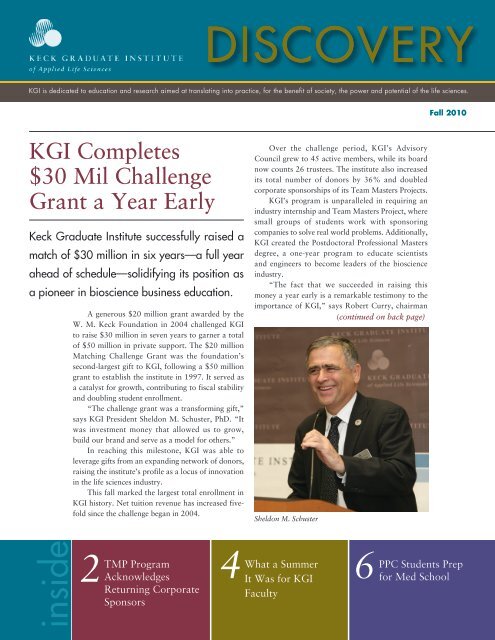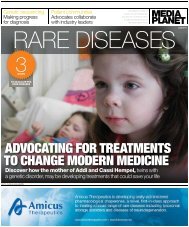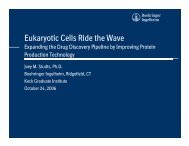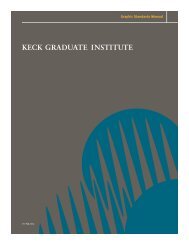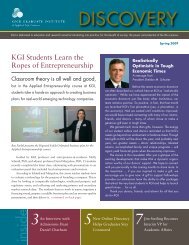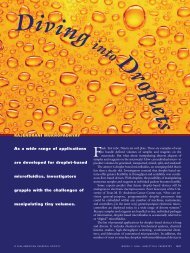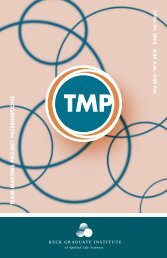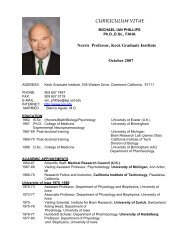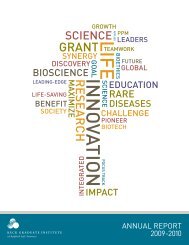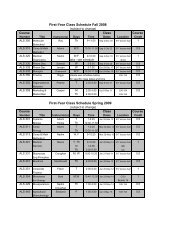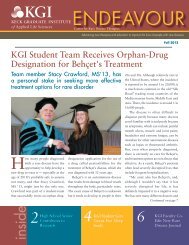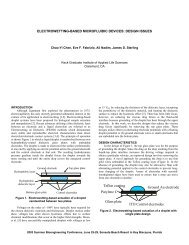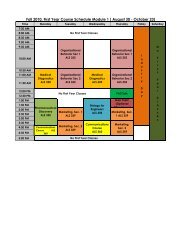Discovery Newsletter: Fall 2010 - Keck Graduate Institute
Discovery Newsletter: Fall 2010 - Keck Graduate Institute
Discovery Newsletter: Fall 2010 - Keck Graduate Institute
- No tags were found...
Create successful ePaper yourself
Turn your PDF publications into a flip-book with our unique Google optimized e-Paper software.
Team Masters Projects2TMP Program AcknowledgesReturning Corporate SponsorsCorporate sponsors of KGI’s Team Masters Project(TMP) program now have the opportunity toincrease their visibility on campus through anew recognition program that rewards their continuingsupport. Companies that commit to consecutive years ofsponsorship can customize a TMP meeting room withtheir corporate identity.“This new recognition program is just another wayto show KGI’s appreciation for our TMP sponsors,especially those who return year after year to supportour students,” says Diana Bartlett, director of corporatepartnerships. “The company’s logo will appear on itsTMP room, strengthening the bond between the sponsorand team. It also will present a continuous reminderto KGI faculty, staff, students and visitors about thecompany, its values and reputation.”The TMP program has grown dramatically in bothsophistication and quantity since it was established in2001. The number of TMPs each year has more thandoubled over the past decade, with six on average in theearly years to 14 teams today.What hasn’t changed is the competitive advantageTMP provides to both students and sponsoringcompanies.“The programs at KGI are ideal for developingscientists who have an understanding of business.Through the TMP, we have access to a group of brightyoung creative students who can take a fresh look at aproject,” says James F. Widergren, a KGI trustee andgroup vice president, Chemistry Systems Business Center,for Beckman Coulter, which has sponsored more TMPsthrough the years than any other company.Another benefit is the TMP’s value as a recruitingtool. “We have the chance to meet, work with, andevaluate students,” he adds. “And there’s an altruisticside. We feel it’s important to give back to the communityand the educational system—particularly to strengthenthe life sciences industry, whether these students go onto work for us or someone else.”TMPs are equally valuable to students. KhushnumaBhesania, president of KGI’s student body, notes: “It’sunlikely I will ever have a chance again in my life tochoose from 14 of the top life sciences companiesand say, ‘I want to be on this project.’ It’s a uniqueopportunity.”KGI differs from most other institutions withexperiential capstone programs in that TMP is requiredrather than optional, of longer duration—many of theothers are only a semester long—and fully integratedinto the curriculum. “At KGI, one day a week is setaside for TMP, ensuring sufficient time is available todevote to the project,” adds Bartlett.“The fact that these companies come to KGI andseek support from our students and faculty when theycould go to a consulting company instead is reallyimpressive,” says Bhesania. “The problem you’resolving for them is a real one. The company is bankingon you for that data and those results. It makes it veryworthwhile.”By Susan Wampler
PPC Students Prep for Med School(from L to R): Andy Nguyen, DanielBurke, Laura Wilson, Ian Phillips,Stephanie Sakamoto, Andrew Griesbaum,Rudy Tsay and Jean Yeo.Eight premed students enrolled in KGI’s newPostbaccalaureate Premedical Certificate (PPC)program this fall in hopes of enhancing theirchances of getting into medical school.6The one-year certificate program is designed to givepremed students the competitive edge that KGI’s uniqueblend of bioscience and business offers. It also gives themthe option of staying an additional year to complete aMaster of Bioscience (MBS) degree.Ian Phillips, faculty advisor for PPC and NorrisProfessor of Applied Life Sciences, said KGI studentswho have gone on to medical school have remarked thattheir KGI experience, with its team building and graduatecourses in medically-related subjects, helped them get intoand to succeed in medical school.“This is a win–win situation for students,” Phillipssaid. “They may get into a medical school and have acareer as a physician, or they may decide to complete anMBS and have a career in industry. Most premed programsonly offer a certificate, which does not qualify the studentfor any career choice if they do not go to medical school.”In addition to the eight students who were acceptedinto the first PPC class, three other applicants opted toenroll in the MBS program. All applicants are required tohave an undergraduate or graduate degree in science orengineering. Members of the first class were selected basedon their science background and scholastic scores.Student Rudy Tsay heard about the PPC program whenhe interned with Phillips the summer before he graduatedfrom UC San Diego with a degree in molecular biology.“I felt it would enhance my candidacy for medicalschool by showing my proficiency and ability to handlegraduate-level work,” Tsay said.The program offers students like Tsay the option ofenrolling in classes at the other Claremont Colleges toround out their resumes, fill in gaps in their transcripts orraise their grade-point averages. As a molecular biologymajor, Tsay was not required to take a full year of organicchemistry lab, which is required by medical schools. So he’senrolled in an organic chemistry lab in addition to the PPCcourse requirements.While KGI cannot guarantee acceptance into medicalschool, the students will be more competitive because of thecoursework KGI offers, said Phillips, who was instrumentalin starting the program.“We offer training in interviewing, time to build uptheir GPAs in The Claremont Colleges and improve theirMCAT scores, and opportunities to meet physicians,” hesaid. “They also take graduate courses only available atKGI in medical diagnostics, drug discovery, business andethics.”By Elaine Regus
KGI Welcomes New Board, AC MembersSix leaders from academia and industryhave joined the KGI Board of Trusteesand Advisory Council, expanding thesetwo important bodies that provideguidance and support for the institution.The new members are:Trustees:Rodney S. MarkinMarkin is currently the interimdean for the College of Medicine atthe University of Nebraska MedicalCenter. He is also the David T. PurtiloDistinguished Professor of Pathologyand Microbiology, along with beingthe courtesy professor of surgery, senior associate deanfor clinical affairs and chairman and president of UNMCPhysicians, a physician group practice for the universitymedical center.Markin founded LAB-InterLink, a technology transfercompany of the University of Nebraska Medical Center thatprovided products for hospital-based laboratory automationsystems. He also developed an automated microbiologyplatform for U.S. Army Medical Research and MaterielCommand.Lilian WuA research scientist, Wu is programexecutive of Global University Programswith IBM Technology Strategy andInnovation. She chairs the NationalResearch Council’s Committee onWomen in Science, Engineering, andMedicine and is a councilor of the Association for Womenin Science.Advisory Council Members:George M. SavageSavage is co-founder of ProteusBiomedical, Inc., a pioneer in integratedtherapeutic, wireless and chipbasedtechnologies. Proteus’ visionfor intelligent medicine is focusedon expanding global access to care,increasing the value delivered by pharmaceuticals andcreating a sustainable model for innovation that leveragescomputer technology in healthcare.Alex SuhSuh is a founding managingdirector with California TechnologyVentures, LLC, a Southern Californiaventure capital firm that focuses itsinvestments in the fields of life sciencesand information technology. He is alsoa founding managing director with JJ Jacobs Enterprises,LLC, and Jacobs Capital Group, LLC, both Pasadena-basedventure capital and fund-of-fund firms where he invested inother global venture capital funds that offer a strategic fitwith California Technology Ventures.James D. TaltonTalton is co-founder, presidentand CEO at Nanotherapeutics inAlachua, Florida. Prior to foundingNanotherapeutics, which is involved inresearch and development of new drugdelivery and biomedical technologiesand products, Talton was the president and CEO of D&EManagement Systems, a leading service organization inFlorida.J. Russell TeagardenTeagarden currently serves asvice president of clinical practices andtherapeutics at Medco Health Solutions,Inc., where he manages a groupinvolved in various clinical developmentfunctions. Prior to joining Medco in1993, Teagarden worked for nearly 15 years as a clinicalpharmacist in critical care and drug information.7
$30 Mil Challenge Grant continued from page 1of the KGI Board of Trustees. “In these economictimes, people don’t give money unless they think it isan important cause and they believe in it.”Curry added that the impact of the challengegrant was “much greater than dollars—it forced usto really get out there and make our story known.”Approximately $14 million of the $30 millionthat KGI raised will go towards its endowmentfund to support the institute’s long term financialsustainability.The $30 million raised by KGI during thechallenge grant period supported the institute incritical ways by providing:• $7.6 million for student support, including eightnew endowed fellowships that strengthened theMaster of Bioscience (MBS) degree to makeit the national standard by which nearly 200other Professional Science Master’s degrees aremeasured;• $6.9 million for faculty support, doubling thenumber of endowed professorships to seven, andexceeding the number available at much largeruniversities;• $6 million supporting KGI programming andprojects, including seed funding for the Centerfor Rare Disease Therapies and the Center forBiomarker Research;• $3.7 million for facilities, such as state-of-the-artclassrooms and research laboratories;• $5.9 million for unrestricted uses.535 Watson Drive • Claremont, California 91711www.kgi.edu


